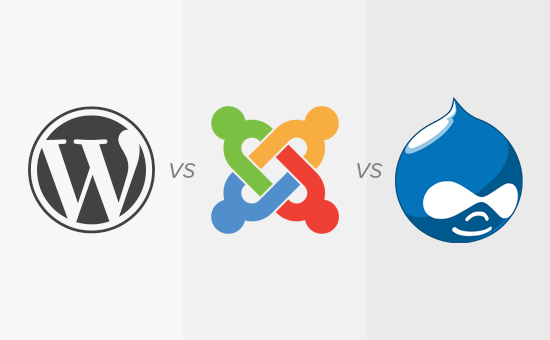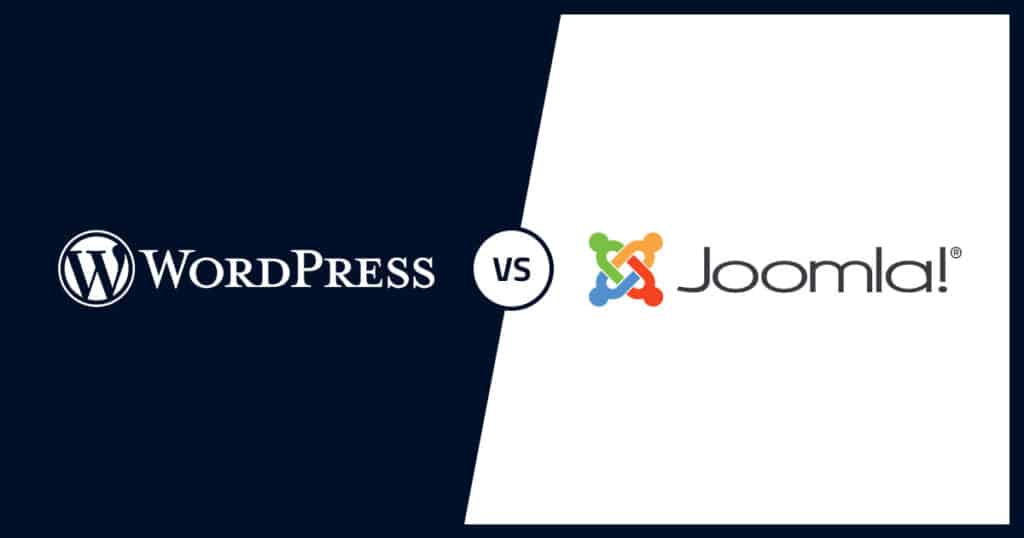WordPress is generally better for beginners and bloggers, while Joomla is ideal for complex websites and developers. Choosing between WordPress and Joomla in 2024 depends on your specific needs and skills.
WordPress is user-friendly, making it perfect for beginners and bloggers. Its extensive plugin library offers flexibility and customization. Joomla, on the other hand, caters to developers and users with technical expertise. It provides advanced features and is great for complex, content-heavy websites.
Both platforms are open-source, offering robust support and community resources. Understanding your project requirements will guide you to the best choice. WordPress excels in ease of use, while Joomla shines in customization and functionality for advanced users.

Ease Of Use
Choosing between WordPress and Joomla can be tough. Understanding their ease of use is key. Let’s explore how user-friendly these platforms are.
User Interface
The user interface is the first thing you notice. WordPress offers a clean and simple dashboard. It is easy to navigate. You can find everything you need without trouble.
Joomla’s interface is more complex. It has more features on the dashboard. Some users find it overwhelming. But, it offers more control over site management.
| Feature | WordPress | Joomla |
|---|---|---|
| Dashboard Simplicity | Very Simple | Complex |
| Navigation | Easy | Moderate |
| Customization Options | Basic | Advanced |
Learning Curve
WordPress is great for beginners. It is easy to learn. You can start building your site quickly. No coding skills are needed.
Joomla has a steeper learning curve. It takes time to master. You may need some coding knowledge. But, it offers more flexibility once you learn it.
- WordPress: Ideal for beginners.
- Joomla: Better for advanced users.
In summary, WordPress is easier to use. Joomla offers more control but is harder to learn. Choose based on your skill level and needs.
Customization Options
When choosing a CMS, customization options matter most. WordPress and Joomla offer unique customization abilities. Let’s dive into the specifics of each.
Themes And Templates
WordPress boasts a vast library of themes. You can find both free and premium themes. These themes cater to various niches. Bloggers, businesses, and e-commerce sites benefit most.
Joomla also offers many templates. These templates provide extensive customization. However, Joomla’s templates may require more technical skills. This can be a hurdle for beginners.
| WordPress | Joomla | |
|---|---|---|
| Free Themes/Templates | 5000+ | 1000+ |
| Premium Themes/Templates | Thousands | Hundreds |
| Ease of Use | Very Easy | Moderate |
Plugins And Extensions
WordPress has a massive repository of plugins. These plugins add features and functionality. You can find plugins for SEO, security, and more. Most plugins are easy to install and use.
Joomla also offers many extensions. These extensions work similarly to WordPress plugins. They add extra functionality to your site. Joomla’s extensions often require more configuration. This makes them less user-friendly for beginners.
| WordPress | Joomla | |
|---|---|---|
| Number of Plugins/Extensions | 58,000+ | 8,000+ |
| Ease of Installation | Very Easy | Moderate |
| Variety | Extensive | Good |
Both WordPress and Joomla offer robust customization. WordPress is easier for beginners. Joomla is powerful but requires more technical skills.
Performance
Performance is crucial for any website. It directly impacts user experience and SEO rankings. Both WordPress and Joomla offer robust options, but how do they stack up against each other in 2024?
Speed And Load Time
Speed and load time are critical factors for any website. A fast website keeps users happy and reduces bounce rates. WordPress has made significant strides in 2024. The new updates focus on optimizing core speed.
Joomla has also improved its speed. It offers several caching options. Both platforms now support lazy loading images. This reduces initial load times.
| Platform | Average Load Time (Seconds) |
|---|---|
| WordPress | 1.5 |
| Joomla | 1.8 |
Resource Management
Effective resource management ensures your website runs smoothly. WordPress has a vast library of plugins. Some plugins can slow down your site. Choose them carefully.
Joomla uses extensions. It also offers a variety of options. Extensions tend to be lightweight. This helps in better resource management.
- WordPress: Thousands of plugins available
- Joomla: Lightweight extensions
Both platforms have improved in 2024. They now offer better resource management tools. This helps in maintaining a fast and efficient website.

Seo Capabilities
When comparing WordPress and Joomla in 2024, SEO capabilities play a crucial role. Both platforms offer tools to enhance your site’s visibility on search engines. Let’s dive into their built-in features and third-party tools.
Built-in Features
Both WordPress and Joomla provide built-in SEO features. WordPress offers a simple, user-friendly interface. You can easily manage meta tags, URLs, and more without coding skills.
Joomla, on the other hand, provides advanced settings. It allows you to control meta descriptions, keywords, and URLs. Joomla’s flexibility can be beneficial for those with technical know-how.
Here’s a comparison table of their built-in features:
| Feature | WordPress | Joomla |
|---|---|---|
| Meta Tags | Easy to manage | Advanced control |
| SEO-friendly URLs | Automatically generated | Customizable |
| XML Sitemaps | Plugin required | Built-in |
Third-party Tools
Third-party tools enhance SEO capabilities for both platforms. WordPress offers popular plugins like Yoast SEO and All in One SEO Pack. These plugins simplify SEO tasks with user-friendly interfaces.
Joomla also has powerful extensions such as sh404SEF and Easy Frontend SEO (EFSEO). These extensions offer advanced options for those with technical skills.
Below is a list of popular third-party tools for each platform:
- WordPress Plugins:
- Yoast SEO
- All in One SEO Pack
- Rank Math
- Joomla Extensions:
- sh404SEF
- Easy Frontend SEO (EFSEO)
- JCH Optimize
Both platforms excel in SEO with their unique offerings. Your choice depends on your technical skills and specific needs.
Security
Choosing between WordPress and Joomla often leads to a debate about security. Both platforms offer unique security features. Understanding these can help you make the best choice for your website.
Default Security Features
WordPress has strong default security features. It frequently updates to fix vulnerabilities. The platform also includes built-in security measures such as:
- Automatic updates for minor versions
- Strong password enforcement
- Two-factor authentication
- Default file permissions
Joomla also offers robust default security. It includes features like:
- Two-factor authentication
- Strong password policies
- Access control levels
- Security extensions
Additional Security Measures
For WordPress, you can enhance security with plugins. Popular options include:
- Wordfence
- iThemes Security
- All In One WP Security & Firewall
These plugins help with:
- Malware scanning
- Brute force attack prevention
- Firewall protection
Joomla also allows additional security through extensions. Top choices are:
- RSFirewall
- Admin Tools
- JomDefender
These extensions offer:
- Malware detection
- Enhanced login security
- Backup solutions
Both platforms provide strong security, but the choice depends on your needs. Consider the default features and additional measures available for each.
Community And Support
Choosing the right CMS is crucial. Community and support play a vital role in this decision. Both WordPress and Joomla have strong communities and excellent support systems. Let’s dive deeper into what each offers.
Documentation
WordPress provides extensive documentation. It includes guides, tutorials, and FAQs. Beginners and experts find it easy to navigate. The documentation is regularly updated. This ensures you have the latest information.
Joomla also offers comprehensive documentation. It covers installation, customization, and troubleshooting. The Joomla documentation is detailed and user-friendly. Like WordPress, it is frequently updated.
User Forums And Help
WordPress has a vibrant user forum. You can ask questions and get answers quickly. The community is large and active. There are also many third-party forums. These forums provide additional help and resources.
Joomla boasts a dedicated user forum. It is a great place to seek help and share knowledge. The Joomla community is smaller but very passionate. This ensures personalized and detailed support. There are also many local Joomla user groups.
| Feature | WordPress | Joomla |
|---|---|---|
| Documentation | Extensive and regularly updated | Comprehensive and user-friendly |
| User Forums | Large and active community | Passionate and dedicated community |
Both CMS platforms offer robust support. Your choice depends on your personal preference.
Cost And Pricing
Choosing between WordPress and Joomla often boils down to cost and pricing. Understanding the expenses can help make an informed decision. Below, we break down the basic and long-term costs associated with both platforms.
Basic Costs
Both WordPress and Joomla are open-source and free to download. However, there are additional costs to consider:
- Domain Name: A domain name usually costs around $10-$15 per year.
- Hosting: WordPress hosting plans start at $3.95/month, while Joomla hosting starts at $5/month.
- Templates/Themes: WordPress themes can range from $0 to $100. Joomla templates have similar pricing.
Here’s a quick comparison table for a clearer view:
| Cost Element | WordPress | Joomla |
|---|---|---|
| Domain Name | $10-$15/year | $10-$15/year |
| Hosting | $3.95/month | $5/month |
| Themes/Templates | $0 – $100 | $0 – $100 |
Long-term Expenses
Long-term costs include maintenance, updates, and premium features:
- Plugins/Extensions: WordPress plugins often require yearly subscriptions. Joomla extensions may have one-time fees or subscriptions.
- Maintenance: Regular updates are crucial for security. Both platforms need periodic updates, often managed by hiring a developer.
- Security: Additional security plugins or services may incur monthly or yearly fees.
These costs can add up over time. Budgeting for them ensures a smooth running website.

Frequently Asked Questions
What Are The Main Differences Between WordPress And Joomla?
WordPress is known for its ease of use and extensive plugin library. Joomla offers more flexibility and advanced user management. Both have strong communities and support.
Which Is Easier To Use, WordPress Or Joomla?
WordPress is generally easier for beginners. Its interface is intuitive and user-friendly. Joomla has a steeper learning curve but offers more customization options.
How Does The Security Of WordPress Compare To Joomla?
Both WordPress and Joomla have strong security features. WordPress requires regular updates and security plugins. Joomla has built-in security measures and advanced user access controls.
Can I Migrate From Joomla To WordPress Easily?
Migrating from Joomla to WordPress is possible but requires careful planning. There are plugins and tools available to assist with the migration process.
Conclusion
Choosing between WordPress and Joomla depends on your needs. WordPress is user-friendly and versatile. Joomla offers more advanced features. Both platforms have their strengths. Assess your project requirements carefully. Make an informed decision to ensure success in 2024. Happy building!
